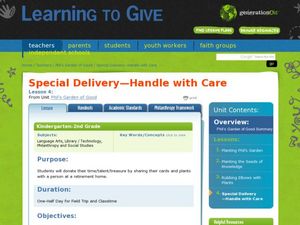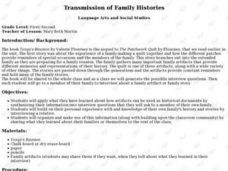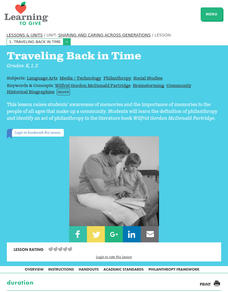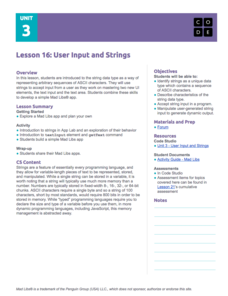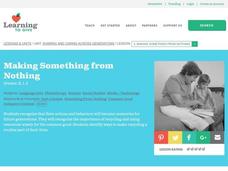Curated OER
Phil's Garden of Good
Students read "The Rainbow Fish" and discuss how the fish benefited by giving others. In this sharing lesson, students prepare plants and letters for senior citizens. Students present their letters and plants at a visit to a senior...
Curated OER
To Kill a Mockingbird, Chapters 22-31: Fun Trivia Quiz
Fun Trivia quizzes can be created by anyone, so this assessment might not address the elements you deem most important in the last 10 chapters of Lee's timeless book. However, it could be a fun follow-up or sponge activity for readers...
Brain Scape
SAT Vocab
Whether preparing for the SAT or just interested in increasing your vocabulary, here's an app that will provide succor to learners desirous of obviating the anxiety associated with the study of esoteric language.
Curated OER
Transmission of Family Histories
Students examine how different artifacts represent family history, stories, and experiences. They act as reporters for their own family artifacts sharing them with the class.
Curated OER
My Life: A Look At Me
Students examine their lives. In this autobiography instructional activity, students write about their lives. They examine their past, and present lives and imagine their futures. They end the instructional activity sharing their...
Curated OER
Traveling Back in Time
Students examine memories and the importance of memories to the people of all ages that make up a community. They explore the definition of philanthropy and identify an act of philanthropy in the literature. The book, 'Wilfrid Gordon...
Curated OER
Hands and Feet of Many Colors
Students perform activities that involve color and shape discrimination. They play games to practice memory skills. Students recognize body parts to participate in activities.
Curated OER
First Things First
Fourth graders complete a narrative writing (focusing on voice) and an illustration about their earliest memory. After listening to a book that sets the stage, 4th graders work in small groups to brainstorm moments they can remember and...
Curated OER
Visiting a Neighborhood Site
Students interview senior citizens about life in the old days. Sharing research with their classmates, they create their own database. They use technology to enhance the information they gathered from the senior citizens.
Code.org
User Input and Strings
Pupils learn to apply strings in computer science. They master two new user interface elements and also use string type data to represent ASCII characters. Finally, individuals create an app for Mad Libs in the eighth lesson of the series.
Code.org
Introduction to Arrays
How can you store lists in a computer program? The 16th installment of a 21-part unit introduces arrays as a way to store lists within a variable. Individuals program a list of their favorite things—adding interest to the activity.
Curated OER
Intergenerational Friendships
Students interview senior citizens. In this communications lesson, students read the book Wilfrid Gordon McDonald Partridge and discuss how to be sensitive to people of a different generation. Students develop interview questions and...
Curated OER
Making Something from Nothing
Learners explore how to make something out of nothing. In this recycling lesson, students discuss the importance of recycling and what effects their choices could have on future generations. Learners create something new out of used...
Curated OER
Listening to History
Students consider the insight to the past that oral histories can provide. They, in groups, analyze oral histories, prepare to interview a family member on their recollections of a historical event and then write a historical narrative.
Animoto
Animoto Video Slideshow Maker
Turn the pictures on your phone into a great looking movies that will blow the hair back of whoever watches it. It is easy to make people laugh, cry, or just inform them about something interesting by using the creative tools available....
Curated OER
Rituals, Scapegoats, and Mobs...Oh My!
One way to teach "The Lottery," a suspenseful and rich short story by Shirley Jackson.
Learning 4 Kids
A Christmas Activities eBook
Get in the Christmas spirit with an ebook detailing 18 holiday inspired arts and crafts, including pompom trees, placemats, paper chains, and more!
Novelinks
The Little Prince: Response to Art Exercise
Depending on your perspective, solitude can be lovely or very, very lonely. Kids take a look at the simple landscape illustrated in Antoine de Saint Éxupery's The Little Prince, and write a short journal entry about their...
Florida Center for Reading Research
Vocabulary: Morphemic Elements, Rooting for Meaning!
Scholars work with root and meaning cards to build vocabulary skills. Playing with a partner, learners read a root, locate its meaning, and cover it with a counter. The first player to cover their board wins.
Florida Center for Reading Research
Phonological Awareness: Phoneme Matching, Medial Match
Early readers get together and match medial phonemes. They take turns picking picture cards from a pile; they say each word, then determine whether the pair has matching medial sounds.
Florida Center for Reading Research
Fluency: Words, Word Climb
Just like climbing a mountain, little learners read to reach the top. They take turns picking high-frequency word cards, reading them, then matching them to the words on their mountain worksheet. They race to reach the top of the...
Florida Center for Reading Research
Vocabulary: Morphemic Elements, Getting to the Root of It
Young readers learn how to get at the root of new vocabulary with this fun language arts activity. When working in pairs, children begin by matching unknown vocabulary words to their Greek or Latin roots. When all the vocabulary cards...
Curated OER
My Summer Vacation: Traveling
A classic lesson idea, kindergarteners share stories about their summer vacations on their first day of school! First, your young learners will listen to you talk about your summer vacation, making sure to use plenty of visual aids. Then...
Curated OER
Twain's Hannibal
High schoolers use primary resources to examine the context the writings of Mark Twain. They criticize the resources for reliability, accuracy, perspective, relevancy, and authoritativeness.
